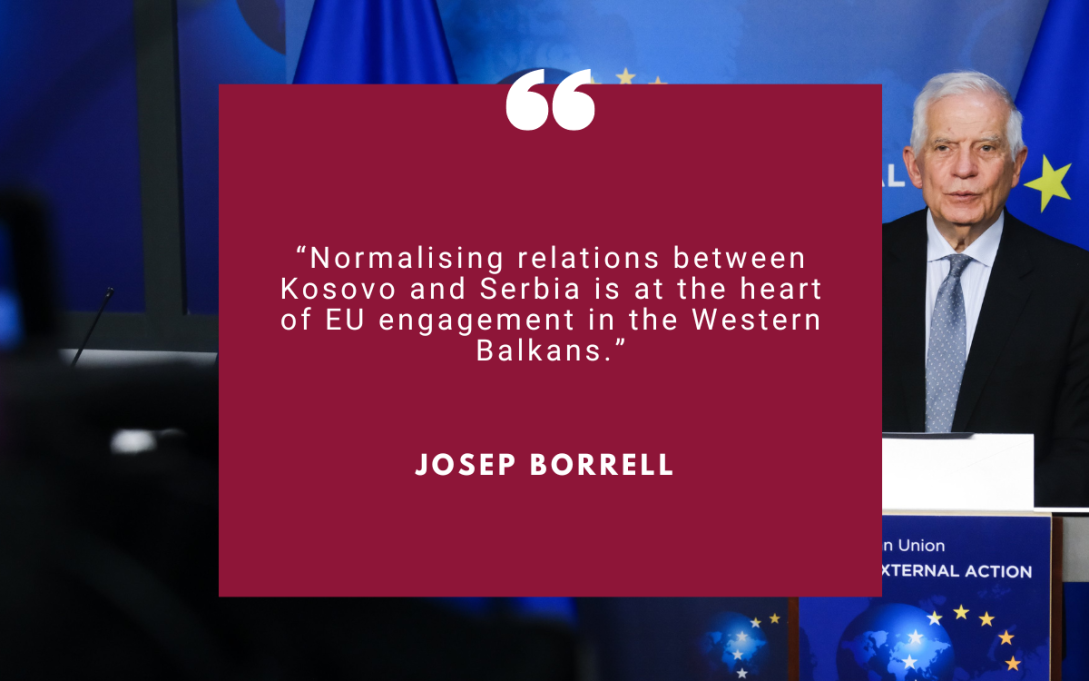The Belgrade-Pristina Dialogue needs courage, vision and political will

When reflecting on the Belgrade-Pristina Dialogue meetings during my mandate, I would initially think of the many challenges we faced: lack of commitment; lack of progress; lack of implementation; lack of willingness to reach consensus. However, despite these many challenges, there have also been some important steps forward.
When I took office, nearly five years ago, my very first visit as High Representative took me to Kosovo. At that time the EU-facilitated Dialogue had been stalled for two years already and needed to be re-energised. The normalisation of relations between Kosovo and Serbia is at the heart of EU engagement in the Western Balkans. It is indispensable to unblock a European future for both, and strengthen security and stability in the region.
In April 2020, I appointed Miroslav Lajčák as a dedicated Special Representative to put the process back on track. We initially advanced on different chapters of a comprehensive agreement over the summer of 2020. However, different political dynamics in the region and an increasingly complex geopolitical context coincided with multiple crises, tensions and escalations.
We have seen roadblocks and barricades erected and taken down, culminating in Kosovo Serbs collectively resigning from their positions in the Kosovo judiciary, police and administration. This constituted a serious setback.
The most dangerous moments occurred in May 2023, when protests in the north of Kosovo turned violent leaving more than 90 KFOR peacekeepers injured. And then on 24 September 2023, when the news reached me during the UN General Assembly in New York, that an armed incursion into the same region had resulted in the killing of a Kosovo police officer and the discovery of a shocking magnitude of military-grade ammunition.
However, despite these challenges and difficulties, our many meetings, visits and calls have also contributed to important steps forward, which should not be forgotten. The Dialogue has delivered tangible improvements to the lives of the citizens in Kosovo and Serbia.
First of all, we make it possible for all citizens of Kosovo and Serbia to travel freely between Kosovo and Serbia using their ID cards, by finally abolishing entry-exit documents. And we solved the car licence plates issue with the mutual recognition of licence plates between Kosovo and Serbia. People can now freely drive through and between them. Freedom of movement is an essential part of normalisation of relations. We also managed to move towards ending the unsustainable 20-year-long practice of non-payment of electricity in the north of Kosovo.
But most importantly, we managed to reach the so-called Ohrid Agreement on the Path to Normalisation and its Implementation Annex in February and March 2023. Reaching such an agreement in times of an unprecedented full-scale war on our continent, was a significant achievement. For the first time, we have put in place a clear framework for the future of the process. Unfortunately, its implementation has yet to start in earnest and both parties bear responsibility for not fulfilling what they promised to do more than a year ago.
As part of this Agreement, we addressed the issue of establishing an Association/Community of Serb-majority municipalities in Kosovo, one of the most sensitive issues in the Dialogue. This was already envisaged in the 2013 and 2015 Brussels Agreements. To help the process move forward, we presented the so-called European Draft Statute to deal with this sensitive issue, but so far it did not become a reality.
Unfortunately, this week’s Dialogue meeting did not bring any progress in the implementation. The discussions were as difficult as ever and, in the end, there was not even a face-to–face meeting between the President and the Prime Minister. Serbia was ready to meet, but Kosovo asked me to pass on a set of preconditions. Currently the two parties’ positions remain far apart. Nevertheless, work will continue: the Chief Negotiators of the Parties agreed to come to Brussels next week to work out concrete steps to unblock the implementation of the Agreement.
In summary, we have done a lot over the past years, but the process can only advance as fast as the two parties are ready to move. The EU facilitation cannot achieve more normalisation than Kosovo and Serbia want. In a few months’ time, different people will be in charge of this file in Brussels, but the European Union’s and its Member States’ expectations will not change. The commitments and obligations of Kosovo and Serbia will not go away.
Everyone will still be looking at the willingness of the Serbian President and Kosovo Prime Minister to deliver a better, European future for their people. In the end, it needs courage, vision, and political will. The EU will continue to help with every step along the way.
MORE FROM THE BLOG

"Une fenêtre sur le monde" - Blog du HR/VP Josep Borrell
Blog de Josep Borrell sur ses activités et la politique étrangère européenne. Vous pouvez également y trouver des interviews, des articles d'opinion, une sélection de discours et de vidéos.
